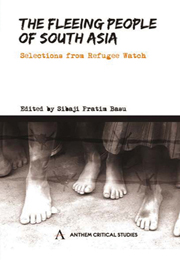Book contents
- Frontmatter
- Contents
- Acronyms and Abbreviations
- Foreword by Ranabir Samaddar
- Preface
- ETHICAL ISSUES
- LAWS
- SOUTH ASIA
- INDIA
- GENDER
- INTERVIEW/CORRESPONDENCE
- REPRESENTATIONS
- Introduction
- Creativity's Mirror
- Writing Displacement: Creativity and Objectivity
- Boundaries, Borders and Bodies
- Forced Displacement and Identity Formation in the EU
- The Changing Scales of Good and Evil: Morality Plays at the Profiled EU and US Borders
- Index
The Changing Scales of Good and Evil: Morality Plays at the Profiled EU and US Borders
from REPRESENTATIONS
Published online by Cambridge University Press: 05 March 2012
- Frontmatter
- Contents
- Acronyms and Abbreviations
- Foreword by Ranabir Samaddar
- Preface
- ETHICAL ISSUES
- LAWS
- SOUTH ASIA
- INDIA
- GENDER
- INTERVIEW/CORRESPONDENCE
- REPRESENTATIONS
- Introduction
- Creativity's Mirror
- Writing Displacement: Creativity and Objectivity
- Boundaries, Borders and Bodies
- Forced Displacement and Identity Formation in the EU
- The Changing Scales of Good and Evil: Morality Plays at the Profiled EU and US Borders
- Index
Summary
In this article, I will argue that the changing international order has hyperbolized international borders where profiling of the world's people takes place. Knowledge about contemporary border practices is inadequate. The aim of this study shows how the drama of processing of people at the border is related to wider political imageries in the US and in Europe. […]
INTRODUCTION
The widely socially shared and often personally lived experiences at the border greatly influenced the way in which the citizens have been educated about the nation state, but they also affect how people are conditioned into contemporary world order. Moreover, it can be claimed that the border related experiences provide an increasingly important loci for political pedagogy. Airports, border crossings and seaports supply not only the physical but also the mental templates into acknowledging the logic and method of separating people into various entities: e.g. into states, communities, nations, ethnicities, cultures and civilizations because a sovereign state's power can be said to be at its most definitive and explicit at the international borders, the recent change towards hierarchical world order has wide ramifications. […]
During the twentieth century, the spread of the universalistic idea of citizenship replaced the particularistic and elitist notions of the past. The border practices in the West were, at least nominally, based on a system of random checks, whereby most, if not all people were inspected for travel documents and for security.
- Type
- Chapter
- Information
- The Fleeing People of South AsiaSelections from Refugee Watch, pp. 436 - 452Publisher: Anthem PressPrint publication year: 2009

